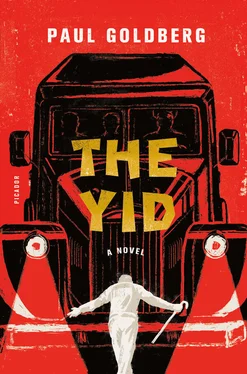As designed, the Nearby Dacha would have been the kind of place Anton Pavlovich Chekhov would have found even more comfortable than the country houses he immortalized.
Kogan recognizes exactly how this Usonian vision of a white country mansion was desecrated by the addition of an Ussrian second floor. This superimposition makes the place look like a tuberculosis sanitarium. The color of the structure is an even greater abomination: a heinous swamp-water green. Anton Pavlovich Chekhov would have been appalled, and Aleksandr Sergeyevich Kogan feels appalled in his stead.
Historians trawl with broken nets. How would they know that, from childhood, specters and visions guided Stalin’s life, determining its course?
His visions pulsed with power. He feared them as a child, and in a misguided effort to quell them, he enrolled in a seminary as a youth.
Stalin’s father, a drunken cobbler, showed up every now and then to mock him. Often he saw the people he had killed, directly, with his hands, as a bank robber. Those whose deaths he ordered didn’t bother him. Some specters threatened him, some mocked him, but he had no cause for fear. What weapons does a specter have?
The old man has no need for sleep. He sits up at his desk, his head upon his hands. He waits for his children, the ones that guide him into his greatest feat, a public execution of killer doctors and all the events that will ensue. Great pent-up power will spill into the streets.
It’s 4:32 a.m. He is awake, alert, awaiting the children, yet they stubbornly remain on the walls, bound to paper. Their turn has not yet come. A vision comes instead: a burst of sunlight, changing from yellow to red, then deeper, thicker, richer, like blood that spurts out of throats while hearts still pump.
A panorama broadens on his wall, like a big map. The sun is no longer whole. Streams flow from it. Rivers form. Red waters pulse like veins.
A specter enters next, projecting on a wall, like a film on a screen. He looks familiar: a dead Jew, a blasphemer of his plans, a voice that shouldn’t be. What is his name?
“Yefim!” he hears a roar within his skull. And what is this? A sword?
“Go away, Yefim,” thinks Stalin, for specters hear thoughts. You speak to them without uttering a word.
Yefim is Zeitlin, a minor commissar, a fighter armed with dreams that cannot cut.
“How many divisions do you have?” the old man mocks. “Dissolve, Yefim, dissolve.”
The thought of power over visions amuses him.
Yefim dissolves, as does his sword. Left alone, Stalin waits to hear purring beneath the floor. He waits for the children to step from their pictures on the walls and start their gentle play, like cheerful circus dwarves. They’ll gather flowers on the carpet, fly paper planes, and draw. They’ll dance as well, but they’ll step softly.
He sees them every night, which means they will come again. His head slips down onto the leather surface of his writing desk. That’s how it has to be, for slumber presages their arrival. Same ritual. Same children. Month after month.
* * *
The Russian historian and playwright Edvard Radzinsky comes closest to offering an accurate account of the events at Stalin’s dacha in the early morning of March 1, 1953.
According to Radzinsky, a security man with the last name Khrustalev (first name unknown) instructed the guards who stood at the doors of Stalin’s private quarters to go to bed.
Instructions of this sort were unheard of at the Nearby Dacha through its thirty-year history. It was commonplace for the tipsy czar to come within a centimeter of sleepy guards, drill them with his lupine eyes, and taunt them. “Chto, spat’ khochesh?” Sleepy, huh?
Though Radzinsky’s account is accurate, he is missing some crucial details.
* * *
“Kogo vezyote, rebyata?” asks Major Khrustalev, coming up to the curb. Whom are you bringing, boys?
“Negrov vezyom,” answers a tall man who seems too old to be a lieutenant.
Khrustalev is a muscular man with a round face, blue eyes, and a brooding soul. This does not distinguish him from other men in his position, but this is all that’s known. It’s late, and Khrustalev isn’t in any shape to click his heels and salute.
His gray State Security cap is somewhere in his office, probably on his desk. He threw it there after loading four singing drunks — Politburo members Beria, Khrushchev, Malenkov, and Bulganin — into a Moscow-bound limousine. They had more than two bottles of juice each. Juice, in the lexicon of the Nearby Dacha, is a wicked young Georgian wine. You drink it by the bucket. It benefits the liver. Khrustalev knows that to be the case. That night, two bottles failed to complete the journey from the cellar to the Big Dining Room. As Khrustalev stands alongside the Black Maria, his happy liver is soaked in purloined juice.
Khrustalev has heard from a checkpoint that an MGB vehicle is heading toward the dacha with Negro prisoners and a written mandate from the old man. Of course, it would be prudent to check whether the mandate is genuine, but there is no way to do it short of asking the old man himself. This is dangerous even when the old man is sober. Perhaps it’s one of Beria’s tricks. There has to be a reason, but it is something from above, and Khrustalev is determined not to get ground up in this.
“Are they under arrest?”
“Comrade Stalin’s orders,” says Levinson, handing Khrustalev the mandate.
“Arrest Paul Robeson…,” the major reads, concluding with “ blya, ” a word that connotes a woman of loose morals, but is used in common speech for emphasis, melody, and balance.
“Paul Robeson?” he asks with disbelief.
“And wife,” adds Levinson.
“I’ll take a look,” says Khrustalev.
As Khrustalev creeps up to the back of the Black Maria to sneak a discreet glance, the lieutenant clenches his teeth, the soldiers sit stone-faced, and the Negroes smile politely.
“He looks young, but she is ugly,” Khrustalev reports to Levinson. “That nose … a coquette , too. Where did you find them?”
“Got them off a plane. They say our chekisty delivered them across the American border to Canada. They say he had a concert near Buffalo, state of New York.”
“Are they arrested?”
“That’s what it says.”
“Wasn’t he a laureate of the Stalin Prize?”
“So was Mikhoels. They think they were rescued, so — quiet…”
“Why are we standing here, talking? Let’s get them in, comrades. Let Comrade Robeson cheer up Iosif Vissarionovich.”
“He would love that. He’s been singing for us all the way from the airfield.”
* * *
Khrustalev walks through the Big Dining Room, singing what appears to be an English translation of a Soviet song:
Fdom bodda undoo bodda,
From oushan un-doo-dunn-blya,
Rayz aap, rayz aap, blya, ze layborink folk,
Ze go-od R-rash-shan folk!
He believes that he sounds a lot like Robeson, and perhaps he does.
Around the corner, outside the Dining Room, Khrustalev’s rendition concludes with a non-melodic “U-u-gh…” Excruciating pain emanating from the shoulder makes him bend over, albeit not low enough to experience relief.
Levinson has a talent for choking his victims while dislocating their shoulders in a wrestling version of a checkmate. This grip can be executed in a manner that causes death.
Inside the dacha, Kogan’s disgust vanishes. He sees a tasteful Frank Lloyd Wright interior, beautiful walnut paneling, comfortable chairs, a well-proportioned table.
* * *
That night, the children fail to show up, but specters bother the old man.
Читать дальше












